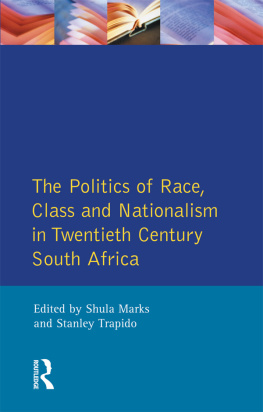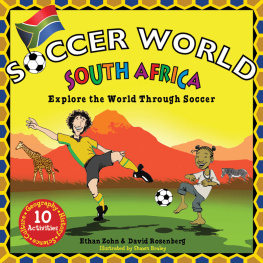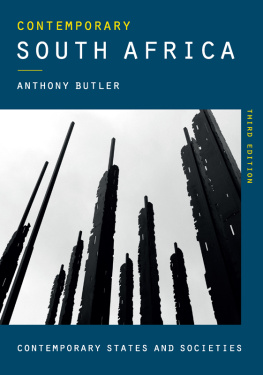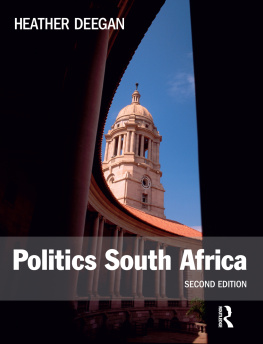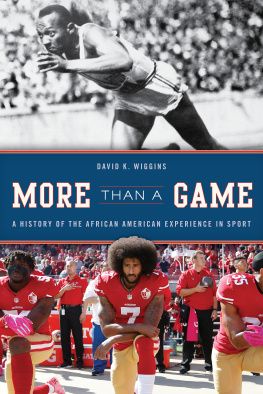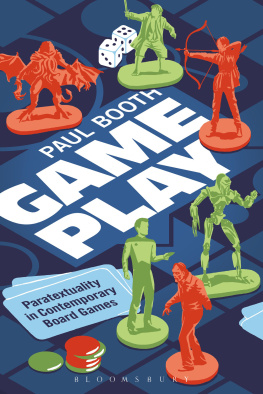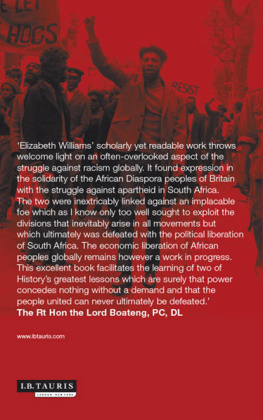Douglas Booth - The Race Game: Sport and Politics in South Africa
Here you can read online Douglas Booth - The Race Game: Sport and Politics in South Africa full text of the book (entire story) in english for free. Download pdf and epub, get meaning, cover and reviews about this ebook. year: 1998, genre: Science / Politics. Description of the work, (preface) as well as reviews are available. Best literature library LitArk.com created for fans of good reading and offers a wide selection of genres:
Romance novel
Science fiction
Adventure
Detective
Science
History
Home and family
Prose
Art
Politics
Computer
Non-fiction
Religion
Business
Children
Humor
Choose a favorite category and find really read worthwhile books. Enjoy immersion in the world of imagination, feel the emotions of the characters or learn something new for yourself, make an fascinating discovery.
- Book:The Race Game: Sport and Politics in South Africa
- Author:
- Genre:
- Year:1998
- Rating:5 / 5
- Favourites:Add to favourites
- Your mark:
- 100
- 1
- 2
- 3
- 4
- 5
The Race Game: Sport and Politics in South Africa: summary, description and annotation
We offer to read an annotation, description, summary or preface (depends on what the author of the book "The Race Game: Sport and Politics in South Africa" wrote himself). If you haven't found the necessary information about the book — write in the comments, we will try to find it.
The Race Game: Sport and Politics in South Africa — read online for free the complete book (whole text) full work
Below is the text of the book, divided by pages. System saving the place of the last page read, allows you to conveniently read the book "The Race Game: Sport and Politics in South Africa" online for free, without having to search again every time where you left off. Put a bookmark, and you can go to the page where you finished reading at any time.
Font size:
Interval:
Bookmark:
Sport in the Global Society

General Editor: J. A. Mangan
THE RACE GAME
CASS SERIES: SPORT IN THE GLOBAL SOCIETY
General Editor: J. A. Mangan

The interest in sports studies around the world is growing and will continue to do so. This unique series combines aspects of the expanding study of Sport in the Global Society , providing comprehensiveness and comparison under one editorial umbrella. It is particularly timely, with studies in the political, cultural, social, economic, geographical and aesthetic elements of sport proliferating in institutions of higher education.
Eric Hobsbawm once called sport one of the most significant practices of the late nineteenth century. Its significance is even more marked in the late twentieth century and will continue to grow in importance into the next millennium as the world develops into a global village sharing the English language, technology and sport.
Other Titles in the Series
Footbinding, Feminism and Freedom
The Liberation of Womens Bodies in Modern China
Fan Hong
The Games Ethic and Imperialism
Aspects of the Diffusion of an Ideal
J. A. Mangan
The Race Game

Sport and Politics in South Africa
DOUGLAS BOOTH
University of Otago

FRANK CASS
LONDON PORTLAND, OR
First Published in 1998 in Great Britain by
FRANK CASS PUBLISHERS
2 Park Square, Milton Park,
Abingdon, Oxon, 0X14 4RN
and in the United States of America by
FRANK CASS PUBLISHERS
270 Madison Ave,
New York NY 10016
Transferred to Digital Printing 2005
Website http://www. frankcass. com
Copyright 1998 Douglas Booth
British Library Cataloguing in Publication Data:
Booth, Douglas The race game: sport and politics in South Africa. (Cassseries: sport in the global society)
1. Sports and state South Africa 2. Apartheid South
Africa 3. Boycotts 4. Athletes, Black South Africa Social
conditions
I. Title
796. 0968
ISBN 0-7146-4799-3 (cloth) ISBN 0-7146-4354-8 (paper)
Library of Congress Cataloging-in-Publication Data:
Booth, Douglas. The race game: sport and politics in South Africa / Douglas Booth. p. cm. (Cass series-sport in the global society)Includes bibliographical references and index.
ISBN 0-7146-4799-3 (cloth). ISBN 0-7146-4354-8 (paper)
1. Discrimination in sports-South Africa. 2. Apartheid-South Africa. 3. Sports-Political aspects-South Africa. 4. Boycotts-
South Africa. 5. South Africa-Race relations. I. Title.
II. Series
GV706.32.B66 1998
306. 4830968-dc21 97-35127
CIP
All rights reserved. No part of this publication may be reproduced in any form or by
any means, electronic, mechanical, photocopying, recording or otherwise, without the
prior permission of Frank Cass and Company Limited.
Typeset by Vitaset, Paddock Wood
Cover photograph: On the Outside:
Maritzburg East Bowling Club (popularly
referred to as the Maritzburg European
Bowling Club), 1991.
To those members of the former South African Council on Sport, particularly Reggie Feldman and Harry Hendricks, who taught me that the sportsfield is not what it seems, and to Gaye who taught me the futility of competition.
Contents
Maps
Tables
List of Illustrations
Between pages 138 and 139
Acknowledgements
This book began life as a doctoral dissertation that I completed in the Department of Politics at Macquarie University, Sydney, in 1992. Colin Tatz and Morris Morley made life at Macquarie stimulating, enjoyable and amusing. Both made incisive comments on the thesis and encouraged me to develop it into a book as did J. A. Mangan and Bruce Kidd, two of my examiners. Colleagues at Otago University, New Zealand, which employed me after I graduated, offered further encouragement. My thanks go especially to John Loy. A grant from the University enabled me to return to South Africa at the end of 1994 and to keep abreast of affairs in the Republic since then.
Two former colleagues at the University of Natal, Yusuf Bhamjee in Pietermaritzburg and Paulus Zulu in Durban, gave valuable assistance during field work in South Africa in 1991 and 1994. They have contributed greatly to my political awareness and consciousness and to my understanding of contemporary South Africa over many years.
My families, in Australia and South Africa, also contributed to this book in numerous ways. Without the love, encouragement, moral support, technical assistance and financial sacrifices made by my wife, Gaye, this project could not have been undertaken and completed.
Notes on Terminology
The apartheid regime classified South Africans into four principal racial groups: African, Coloured, Asian or Indian and White. Black , the preferred term of the majority nonracial/mass democratic movement, denotes those groups collectively referred to by the government as non-white (previously Non-European ). Hence in this book black and non-white share the same broad inclusive meaning. Multiracial activities referred to those in which different racial groups partook together. It carried negative connotations, implying that South Africa was a confederation of national racial groups. In contrast, nonracial was a colour-blind term and recognized South Africa as a unitary state. In the late 1980s the anti-apartheid movement adopted a new lexicon to reflect increasingly blurred racial divisions: establishment refers to pro-apartheid forces and disadvantaged refers to the traditional and new victims (including poor whites) of apartheid policies.
A township is an African urban residential area. During apartheid they were located in both white South Africa and the tribal reserves. In National Party parlance the latter are called homelands.
The derogatory Kaffir or Kafir (Arabic meaning infidel), Hottentot, Native and Bantu appear only in quotations. In keeping with the current lexicon, Khoikhoi and San refer to the nomadic pastoralists (Hottentots) and hunter gatherers (Bushmen) respectively, who occupied the Cape at the time of European arrival. Even in colonial times the distinction between these groups was blurred and Khoisan is a composite term. Coloured is a portmanteau term referring to Khoisan, their descendants and the off-spring of mixed liaisons.
By around 1780, a distinct political consciousness developed among the Trekboers, semi-nomadic farmers of mainly Dutch descent in the Cape. The Voortrekkers (pioneer Trekboers) left the Cape in the early to mid-nineteenth century. For ease of expression, these groups are referred to as Afrikaners although a distinct Afrikaner ethnic identity did not appear until the first quarter of the twentieth century. Dutch-Afrikaner applies to those middle- and upper-class Dutch who stayed in the Cape during the nineteenth century.
Springboks and All Blacks are the respective sobriquets for individuals and teams representing South Africa and New Zealand; Wallaby is the nickname given to a player who represents the Australian Rugby Union.
A rebel sports tour is an unofficial tour approved by neither the international controlling federation nor the national controlling association to which the rebels are affiliated.
Abbreviations
Next pageFont size:
Interval:
Bookmark:
Similar books «The Race Game: Sport and Politics in South Africa»
Look at similar books to The Race Game: Sport and Politics in South Africa. We have selected literature similar in name and meaning in the hope of providing readers with more options to find new, interesting, not yet read works.
Discussion, reviews of the book The Race Game: Sport and Politics in South Africa and just readers' own opinions. Leave your comments, write what you think about the work, its meaning or the main characters. Specify what exactly you liked and what you didn't like, and why you think so.


